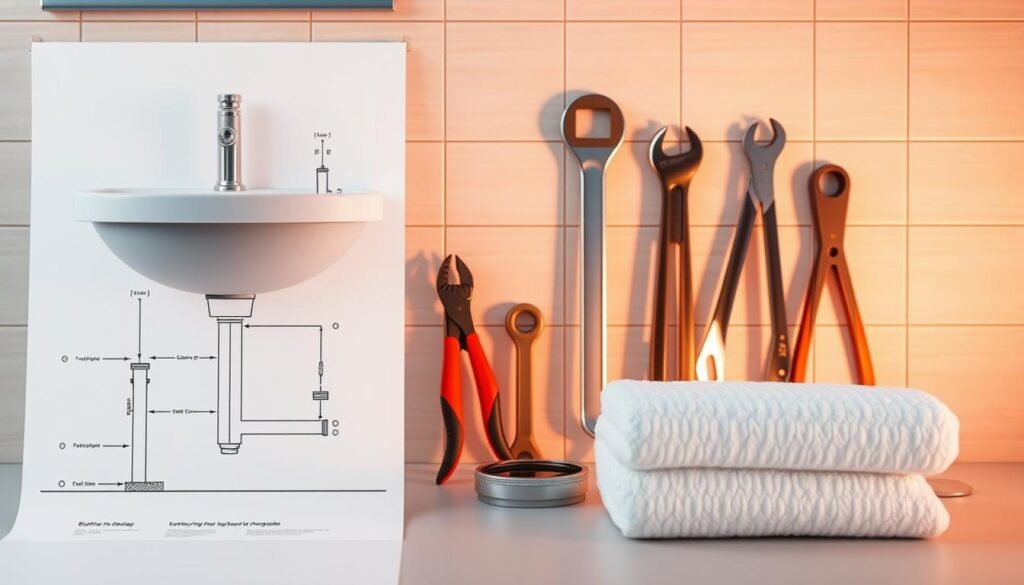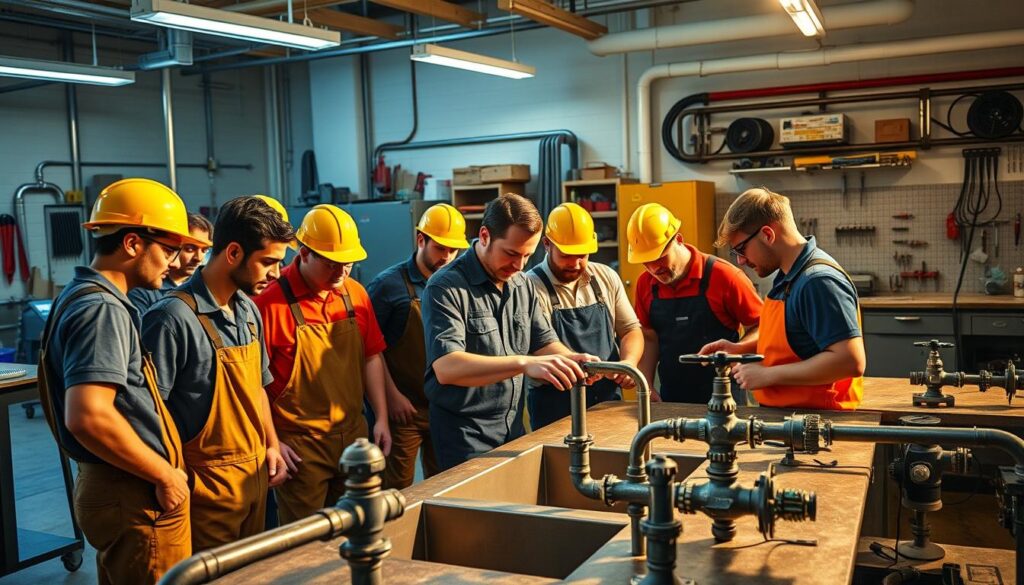Affiliate Disclosure
Plumber Guide Guys is a participant in the Amazon Services LLC Associates Program, an affiliate advertising program designed to provide a means for sites to earn advertising fees by advertising and linking to Amazon.
How Do I Become a Plumber? Are you tired of sitting behind a desk? Do you want a career that’s hands-on and rewarding? Becoming a plumber could be your ticket to a fulfilling job.

The plumbing trade is a dynamic career path. It offers meaningful work and good pay. With the demand for skilled tradespeople growing, becoming a plumber is a great chance to build a secure and profitable career.
This guide will show you how to start your plumbing career. You’ll learn about the basics, apprenticeships, and getting certified. You’ll find a clear path to success in the plumbing industry.
Key Takeaways
- Plumbing offers a stable and well-paying career path
- Minimal student debt compared to traditional four-year degrees
- Multiple training options including technical schools and apprenticeships
- Potential for high plumbing career salary with experience
- Opportunities for specialization and business ownership
Table of Contents
Understanding the Plumbing Trade Fundamentals
Starting a career in plumbing needs a strong base of knowledge and skills. Your plumber training will start with the basics that make plumbing both tough and rewarding. Plumbing trade school lays the groundwork for your success in this key profession.
Plumbing is a complex field that requires precision, technical knowledge, and practical skills. Before you start working with pipes, you need to understand several key areas.
Essential Tools and Equipment
Professional plumbers use a special toolkit that’s more than just household tools. Your training will introduce you to important equipment like:
- Pipe wrenches and adjustable spanners
- Pipe cutters and threading machines
- Drain snakes and inspection cameras
- Soldering and welding equipment
Basic Plumbing Systems Overview
It’s key to know how water supply and drainage systems work. In your training, you’ll learn about:
- Residential water distribution networks
- Waste and soil pipe configurations
- Ventilation systems
- Pressure regulation mechanisms
“Knowledge of plumbing systems is the foundation of every successful plumber’s career.” – Professional Plumbing Association
Safety Protocols and Standards
Safety is the top priority in plumbing training. You’ll learn about:
- Personal protective equipment (PPE)
- OSHA workplace safety guidelines
- Risk assessment techniques
- Proper handling of hazardous materials
Learning these basics will get you ready for the practical challenges of plumbing. It sets you up for a successful and rewarding career in this vital trade.
Educational Requirements and Training Paths
Choosing the right educational path is key for aspiring plumbers. Your journey into plumbing can take different routes. Each offers unique benefits for a successful career.
Plumbing apprenticeship programs offer the best training. They mix classroom learning with real-world experience. This gives you a strong base in the trade. You’ll find two main educational paths:
- Certificate Programs (6-12 months)
- Associate Degree in Plumbing (2 years)
Certificate programs are great for quick entry into the trade. They focus on key skills and knowledge. You’ll learn about:
- Pipe system installation
- Reading technical blueprints
- Basic electrical and safety protocols
- Residential and commercial plumbing techniques
Associate degree programs offer deeper training. These two-year programs include advanced math, physics, and plumbing tech courses. Students get broader knowledge for more career chances.
Pro tip: Research local trade schools and community colleges to find the best plumbing education program for your career goals.
When picking your path, think about program length, cost, local job needs, and state certification rules. Each path has its benefits. Choose the one that fits your career dreams.
How Do I Become a Plumber: Step-by-Step Career Path
Starting a career as a plumber needs careful planning and steps. The path includes education, training, and skill building. Knowing how to become a plumber means having a clear plan and dedication to your growth.
Your plumbing journey starts early, with important steps for success. Each stage adds vital skills and knowledge for a great career.
High School Preparation
High school is key for a strong plumbing career. Focus on certain skills and subjects:
- Take math courses like algebra and geometry
- Enroll in technical drawing or computer-aided design classes
- Join vocational programs for hands-on training
- Work on problem-solving and critical thinking
Technical School Options
Technical schools offer structured learning for plumbers. Look for programs that teach:
- Plumbing systems and infrastructure
- Safety protocols
- Blueprint reading
- Basic electrical and mechanical systems
| Program Type | Duration | Key Benefits |
|---|---|---|
| Certificate Program | 6-12 months | Quick entry into workforce |
| Associate Degree | 2 years | Comprehensive technical knowledge |
Apprenticeship Programs
Apprenticeships offer hands-on learning in plumbing. They mix classroom learning with real-world experience. This helps you learn plumbing through practical training.
Most apprenticeships need:
- Minimum age of 18
- High school diploma or GED
- Physical fitness
- Ability to pass background checks
“An apprenticeship is your gateway to a successful plumbing career, providing invaluable experience and professional connections.” – Professional Plumbers Association
By following these steps, you’ll be ready for plumbing jobs and a promising career in the trades.
Plumbing Trade School Programs and Duration

Thinking about a career in plumbing? It’s key to know about plumbing trade school programs. These courses are the start of a successful plumbing career.
There are two main paths in plumber training courses:
- Certificate Programs
- Duration: 6-12 months
- Focus on essential skills
- Cover plumbing codes and safety protocols
- Associate Degree Programs
- Duration: 1.5-2 years
- Comprehensive curriculum
- Advanced technical theory and practical training
Choosing a plumbing trade school depends on your goals, time, and money. Certificate programs get you working fast. Associate degrees offer deeper knowledge and better job chances.
When picking a plumbing trade school, consider these:
- Accreditation status
- Hands-on training facilities
- Instructor expertise
- Job placement assistance
Take time to look into local plumber training courses. The right program will give you the skills and knowledge for a successful plumbing career.
Apprenticeship Requirements and Expectations
Plumbing apprenticeship programs are key to becoming a pro plumber. They teach the skills needed for plumbing jobs. Knowing what’s expected is important for those starting this trade.
Apprenticeships mix hands-on experience with learning. They last 4-5 years and focus on building your skills.
Required Work Hours
Apprenticeships require a lot of time. You’ll spend:
- 2,000 hours a year on the job
- 144 hours a year in class
- 8,000-9,000 hours total over 4-5 years
On-the-Job Training Components
Practical training covers important skills:
- Pipe installation and repair
- Reading blueprints
- Safety and equipment use
- Understanding electrical and mechanical systems
Mentorship Opportunities
Master plumbers offer great guidance. They help turn theory into practice. This ensures you learn to solve real problems.
| Apprenticeship Stage | Key Learning Objectives | Skill Development Focus |
|---|---|---|
| First Year | Basic tool use and safety | Fundamental techniques |
| Second Year | Advanced installation skills | Complex system understanding |
| Third Year | Specialized system knowledge | Commercial and residential applications |
| Fourth Year | Independent problem solving | Comprehensive trade mastery |
Your hard work in apprenticeships will shape your future in plumbing. Stay committed, keep learning, and seize every chance to grow.
Licensing and Certification Process
Getting a journeyman plumber license is a big step in your career. The rules for getting certified vary by state. But, they all check your technical skills and practical knowledge.
To get a journeyman plumber license, you must do a few things:
- Complete a state-approved apprenticeship program
- Log the required number of work hours (usually 4-5 years)
- Pass a tough licensing exam
- Show you know the local building codes
The licensing exam tests your plumbing knowledge in important areas:
| Exam Component | Key Focus Areas |
|---|---|
| Written Test | Plumbing codes, safety rules, technical knowledge |
| Practical Skills Assessment | Hands-on problem-solving, installation techniques |
| Code Compliance | Local and state plumbing standards |
Your journeyman plumber license is more than a piece of paper. It shows your skills, hard work, and commitment to top-notch plumbing work. Most states make you keep learning to keep your license. This keeps you up-to-date with new tech and best practices.
Preparation is key to passing the plumber certification tests. Think about taking prep courses, studying local codes, and talking to experienced plumbers. They can help guide you through the process.
Journey to Master Plumber Status
Getting to be a master plumber takes hard work, skill, and always learning more. After getting a journeyman plumber license, many want to be the best by becoming a master plumber.
Advanced Skills Development
Going from a journeyman to a master plumber means getting better at many things. You’ll need to:
- Learn how to design complex plumbing systems
- Get good at finding and fixing problems
- Know how to install things in a special way
- Understand all the rules and laws about plumbing
Business Management Training
Being a master plumber is not just about fixing pipes. You’ll also need to learn about running a business:
- How to plan your money
- How to estimate costs for projects
- How to deal with customers
- How to use your resources wisely
Leadership Requirements
To be a master plumber, you must be a good leader. You’ll have to:
- Manage a team of workers
- Teach new plumbers
- Make sure everything is done right and safely
| Career Stage | Key Responsibilities | Required Skills |
|---|---|---|
| Apprentice | Learning basic techniques | Technical fundamentals |
| Journeyman | Independent work execution | Advanced technical skills |
| Master Plumber | Project management, mentoring | Leadership, business acumen |
Your journeyman plumber license is a big step toward becoming a master plumber. Strategic planning and continuous education are essential for this journey.
Salary Expectations and Career Growth

Exploring how to become a plumber shows promising salary opportunities. Plumbing is a rewarding career with good pay at all levels of experience.
The salary for plumbers depends on several factors:
- Geographic location
- Years of experience
- Specialization areas
- Professional certifications
Apprentices start with salaries between $30,000 and $40,000 a year. Journeyman plumbers can earn $50,000 to $70,000. Master plumbers with advanced skills and business ownership can make over $90,000 annually.
Salaries also vary by location. Cities like San Francisco and San Jose pay more, with experienced plumbers earning about $80,000 a year.
There are many ways to grow in your plumbing career:
- Residential plumbing services
- Commercial plumbing projects
- Industrial pipe installation
- Plumbing inspection roles
- Independent business ownership
To increase your salary, keep learning new skills. Get advanced certifications and focus on in-demand areas like green plumbing or commercial projects.
Specialization Areas in Plumbing
The plumbing industry has many paths for those wanting a unique career. By choosing a specialization, you can make your skills valuable and fulfilling.
Looking into plumber training courses, you’ll find many exciting options:
- Residential Plumbing: Focusing on home water systems, repairs, and installations
- Commercial Plumbing: Working with larger-scale building infrastructure
- Industrial Pipefitting: Managing complex mechanical systems
- Green Plumbing Technologies: Implementing sustainable water solutions
Each area needs special skills and extra certifications. For example, advanced plumber training courses can teach you about medical gas systems, compressed air systems, or fuel piping installations.
Choosing a specialization can greatly shape your career. Some fields offer better pay and less competition. By picking the right focus, you become a key player in specific plumbing markets.
Your career might involve ongoing learning and getting special certifications. Think about gasfitting or water treatment systems to open up more job chances.
State-Specific Requirements and Regulations
Understanding state plumbing license rules can be tricky. Each state has its own set of rules for plumbers. It’s important to know these rules before you start your career.
Plumber certification rules differ from state to state. To follow the law, you must learn and meet the specific rules in your area.
License Renewal Requirements
To keep your plumbing license active, you need to follow a few steps:
- Renew your license every 2-3 years
- Send in updated documents
- Show proof of recent work experience
- Pay the renewal fee
Continuing Education
Most states require plumbers to keep learning. Continuing education includes:
- 4-12 hours of training each year
- Updates on technical skills
- Refreshers on safety protocols
- Workshops on code compliance
Local Code Compliance
It’s vital to follow local plumbing codes. These rules keep everyone safe and protect public health. Always check with your state’s licensing board for the latest local rules.
Professional tip: Rules can change, so it’s important to stay updated to keep your plumbing certification.
Conclusion
Starting a career as a plumber is exciting. It takes dedication, hard work, and a commitment to learning. The plumbing trade is stable, with good growth and pay.
Your salary can grow as you learn more and get better at your job. You can work in many areas, from homes to big buildings. Apprenticeship programs are key to your growth, teaching you skills and experience.
Being good at solving problems and adapting is important. Plumbers need to keep up with new tech and systems. Your eagerness to learn will help you succeed in this field.
Being a plumber is more than a job. It’s a career that helps communities and improves people’s lives. Whether you’re new or looking to improve, becoming a plumber is rewarding.

